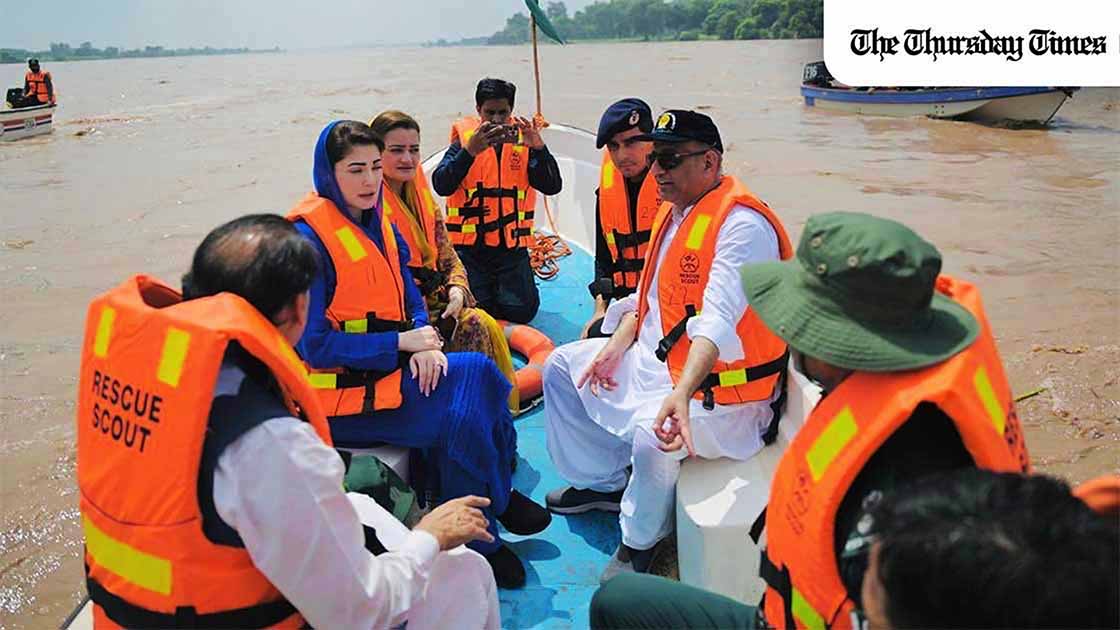TLDR
• Maryam Nawaz personally inspected the Ravi floods by boat in Lahore.
• She ordered Punjab’s largest-ever rescue mobilisation with army deployment in seven districts.
• Over 260 relief camps and 160 medical centres are operating across Punjab.
• Provincial administration, PDMA, Rescue 1122, and law enforcement have been fully activated.
• She has directed long-term water storage and flood management planning.
LAHORE (The Thursday Times) — Amid Punjab’s heaviest floods in decades, Chief Minister Maryam Nawaz has taken direct charge of the province’s largest-ever rescue and relief campaign. With six rivers swelling beyond their banks, nearly 1.2 million people affected and over 250,000 displaced, her leadership has become the centrepiece of Punjab’s fight against disaster.
Punjab’s largest-ever rescue operation
In response to India’s sudden upstream water release, Maryam Nawaz authorised a massive flood relief operation in Punjab (August 2025). The Pakistan Army has been deployed in seven districts — Lahore, Kasur, Sialkot, Narowal, Faisalabad, Okara and Sargodha — to reinforce civilian authorities. Rescue 1122, PDMA, police, and civil defence remain on 24-hour duty.
On the ground with victims
Breaking from the detached style of past governments, Maryam Nawaz has been physically present in flood zones. In Shahdara, she boarded a boat to inspect the Ravi River swells, declaring: “I have never seen so much water in the Ravi. Without timely preparations, the damage could have been catastrophic.”
Relief camps and medical aid
To date, 263 relief camps and 161 medical centres have been set up across Punjab, providing food, shelter and healthcare. Emergency health workers are on standby in affected districts. In Narowal and Kasur, Sikh gurdwaras inundated by water were prioritised for clearance on her direct orders, ensuring religious activities were not disrupted.
Federal-provincial coordination
Maryam Nawaz joined Prime Minister Shehbaz Sharif in an aerial survey of flood-hit Narowal and surrounding areas. NDMA officials briefed both leaders on water levels and rescue progress. The Prime Minister praised Punjab’s swift mobilisation, urging coordinated efforts nationwide.
Crisis governance in action
At cabinet meetings running late into the night, the Chief Minister ordered the immediate use of all resources for flood victims. Hospitals have been instructed to keep emergency wards staffed, and supply chains for medicines and food are being monitored from the Chief Minister’s Office.
Preparing for the future
Unlike purely reactive disaster management, Maryam Nawaz has insisted on long-term water management strategy. Officials have been tasked to develop reservoir and small dam projects to store floodwaters for agriculture and energy — turning a threat into opportunity.
Symbol of solidarity
For ordinary Punjabis, her constant presence — on boats, in relief camps, and at hospital bedsides — has become symbolic. Framed as “Punjab’s daughter,” Maryam Nawaz’s approach is viewed as an embodiment of responsive governance, setting a new precedent for crisis leadership in the province.





